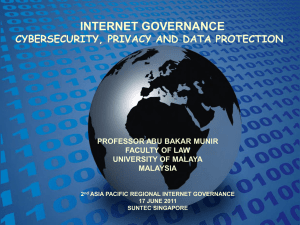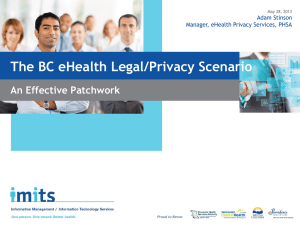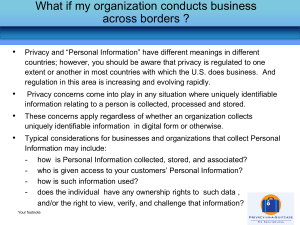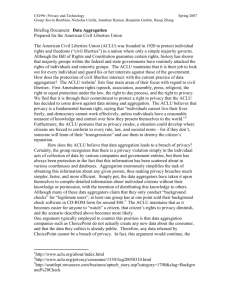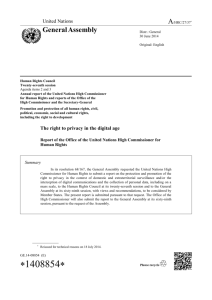Technology and the Surveillance Society
advertisement
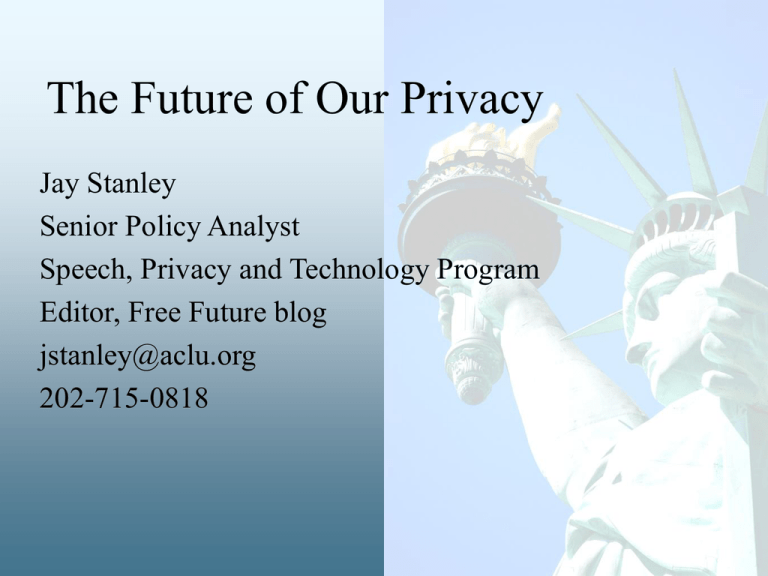
The Future of Our Privacy Jay Stanley Senior Policy Analyst Speech, Privacy and Technology Program Editor, Free Future blog jstanley@aclu.org 202-715-0818 I. THE CHALLENGE TO OUR PRIVACY The challenge to our privacy: Technology revolution A burgeoning security establishment Profit Motives The challenge to our privacy: Technology revolution A burgeoning security establishment Profit Motives Change at light speed “Disruptive technologies” Smart grid DNA Video surveillance Video Surveillance: a new era Face recognition Iris recognition Behavioral analytics License plate recognition Location-tracking The ultimate in location tracking: Drones Advanced imaging technologies The Ultimate Example: Total Information Awareness NYC/Microsoft “Domain Awareness System” Meanwhile: Moore’s Law Charts: Zoomer Magazine, Computer Measurement Group The Future of Moore’s Law Intel Core i7-2600 Processor: $294.99 on Newegg The Future of Moore’s Law Today: $294.99 The Future of Moore’s Law Today: $294.99 In 20 years: $0.03 The Future of Moore’s Law Also following Moore’s Law 20 years: 1,000-32,000x today’s power Faster, cheaper – and smarter Hans Moravec: 2020s In whose interest? How will AI be used? Are we ready for all this? The challenge to our privacy: Technology revolution A burgeoning security establishment The Security State • NSA: 30,000 employees • CIA: 20,000 employees • Others: many more • Overall IC: at least $57 billion • Oversight? Not much. • FBI: 33,000 Swinging the telescope inward FISA Amendments Act of 2008 General Warrants. No specificity required. (All USLondon traffic?) Little judicial oversight. FISA court only reviews the government’s “targeting” and “minimization.” No role overseeing actual use of surveillance power. No limits on use of data. Huge databases, stored forever, shared with anyone, re-used for any purpose. Domestic e-mails included. Location uncertain? Go ahead! Immunity for lawbreakers. Don’t try this at home! Cybersecurity The challenge to our privacy: Technology revolution A burgeoning security establishment Profit Motives Internet advertising Internet advertising Data brokers & “big data” www.aclu.org/surveillance An emerging surveillanceindustrial complex Recruiting or pressing private companies into service Partnerships with data companies Lobbying by companies for more surveillance Many options for accessing private data 1. 2. 3. 4. 5. Ask for data to be shared voluntarily Simply buy information Demand it using legal powers “Bake in” surveillance Create regularized systems for standing access to records of private activities Are we ready for all this? Jurisprudence off-track Reasonable expectation” standard Third-party doctrine Arbitrary situation Congress isn’t keeping up either: Just a few things have changed since ECPA drafted in 1986… 1990: World Wide Web created 1994: Yahoo & Amazon founded 1998: Google founded 2004: Facebook launched Lifecycle of an email Unopened < 180 days Warrant > 180 days Opened Subpoena or 2703(d) with notice Header info Basic subscriber info (name, address, connection records, etc) Subpoena or 2703(d) NO notice req’d And email was one of the specific technologies that existed in 1986! What about… Search Location-based services Cloud Computing FISA Amendments Act How this plays forward 1. Behavior changes Human are social animals Constantly monitoring, finely aware of how we’re perceived by those around us That means privacy gaps rarely last Lag time in privacy awareness Chilling Effects: The Facebook “blandification” effect Chilling effects can also be spurred by many technologies • Surveillance cameras • Government eavesdropping • Offline data collection How this plays forward 1. Behavior changes How this plays forward 1. Behavior changes 2. Law/practice changes Where we just find invasions intolerable and change the world to end them • ECPA reform • Commercial privacy regulation • Drone regulation ACLU in the courts • NSA spying ACLU in the courts • National Security Letters ACLU in the courts • Cell phone location data ACLU in the courts • Laptops at the border How this plays forward 1. Behavior changes 2. Law/practice changes How this plays forward 1. Behavior changes 2. Law/practice changes 3. Expectations change Public-private boundary Video rental records Marriage Campaign donations The home Professional confidences License Plates Arrests Real estate transactions Public-private boundary Video rental records Marriage Campaign donations The home Professional confidences License Plates Arrests Real estate transactions Public-private boundary Video rental records Marriage Campaign donations The home Professional confidences License Plates Arrests Real estate transactions How this plays forward 1. Behavior changes 2. Law/practice changes 3. Expectations change How this plays forward 1. Behavior changes 2. Law/practice changes 3. Expectations change 4. Things just get worse III. WHAT MUST BE DONE? What Must Be Done? 1. Enact comprehensive privacy laws What Must Be Done? 2. Enact technology-specific privacy laws What Must Be Done? 3. Create institutions to enforce privacy laws What Must Be Done? 4. Revive the 4th Amendment Contact info: Jay Stanley Speech, Privacy and Technology Program Free Future blog: www.aclu.org/freefuture jstanley@aclu.org 202-715-0818 asdf ASDF asdf



